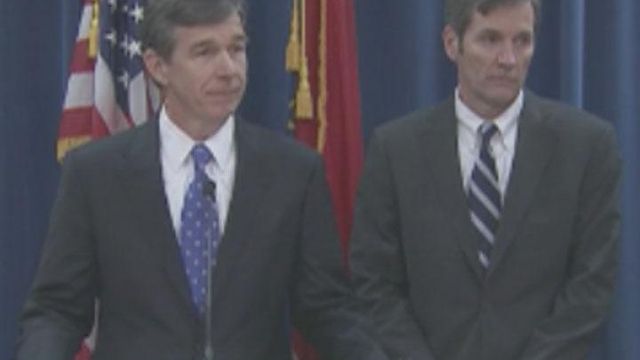Cooper: State needs more tools for public corruption cases
Attorney General Roy Cooper says North Carolina needs investigative grand juries in order to better prosecute corruption by government officials.
Posted — UpdatedCooper and Wake County District Attorney Colon Willoughby called on the General Assembly Thursday to pass laws making it a crime to lie to a State Bureau of Investigation agent and to allow prosecutors to convene investigative grand juries for public corruption and financial fraud cases.
Willoughby noted that North Carolina prosecutors have long been able to use grand juries to gather evidence against those selling drugs.
"Our legislature 20 years ago said this tool was appropriate for people who were selling drugs. Why can't we use that tool for people who are selling our government?" Willoughby said.
Former Gov. Mike Easley and former House Speaker Jim Black, both Democrats, pleaded guilty to corruption-related charges in the past 10 years. But there have been investigations into officials across the state, in all branches and levels of government, Cooper said. He estimated that the SBI had pursued some 500 public corruption cases over the past 10 years.
But witnesses can be reluctant to testify against powerful public officials or their allies. Grand juries can compel witnesses to testify in exchange for immunity.
And many know that lying to an SBI agent carries no penalty.
"It's clear that some cases have foundered because of that," Cooper said.
He noted instances when witnesses told one story when first interviewed by the SBI but changed their story when the SBI agent came back with an FBI agent. Lying to an FBI agent is a federal crime.
This is not the first time Cooper has asked the legislature for these changes. He has made similar proposals during recent legislative sessions.
Asked why the lawmakers haven't granted these two powers before, Cooper said he has heard concerns that prosecutors might abuse their authority. Both Cooper and Willoughby said judges oversee grand juries and prevent their abuse.
"Public officials, most of them, want to get the bad ones out," Cooper said.
Lawmakers say they will consider the idea.
"We will certainly consider it," said Rep. Leo Daughtry, R-Johnston, chairman of the House Judiciary Committee.
"I think some other legislators think it could become political. You could try to embarrass somebody and investigate somebody when there's really no case there," Daughtry said. "I don't have that concern."
The legislative session begins on Jan. 30.
Related Topics
Copyright 2024 by Capitol Broadcasting Company. All rights reserved. This material may not be published, broadcast, rewritten or redistributed.





